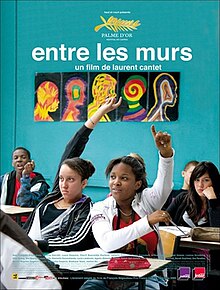Entre les murs
| The Class | |
|---|---|

Theatrical release poster featuring Esmeralda Ouertani and Rachel Regulier
|
|
| Directed by | Laurent Cantet |
| Produced by |
Caroline Benjo Carole Scotta |
| Written by | Laurent Cantet François Bégaudeau Robin Campillo |
| Based on |
Entre les murs by François Bégaudeau |
| Starring | François Bégaudeau |
| Cinematography | Pierre Milon |
| Edited by | Robin Campillo |
| Distributed by | Haut et Court |
|
Release date
|
|
|
Running time
|
128 minutes |
| Country | France |
| Language | French |
| Budget | €2.5 million |
| Box office | $28.7 million |
The Class is a 2008 French drama film directed by Laurent Cantet. Its original French title is Entre les murs, which translates literally to "Between the walls" or "Within the walls". It is based on the 2006 novel of the same name by François Bégaudeau. The novel is a semi-autobiographical account of Bégaudeau's experiences as a French language and literature teacher in a middle school in the 20th arrondissement of Paris, particularly illuminating his struggles with "problem children": Esmerelda (Esmeralda Ouertani), Khoumba (Rachel Regulier), and Souleymane (Franck Keïta). The film stars Bégaudeau himself in the role of the teacher.
The film received the Palme d'Or at the 2008 Cannes Film Festival, making it the first French film to do so since 1987, when Maurice Pialat won the award for Under the Sun of Satan. The Class was also nominated for an Academy Award for Best Foreign Language Film but lost to Departures.
The film centers around Marin and the various experiences he has with students in his French literature class within one academic year. The class is difficult, as Marin is unable to relate to his students due to his ethnicity and class status . Marin makes various attempts to try and garner trust and respect from his students but fails miserably . At the students' protest of their dislike of the required reading material Anne Frank, due to lack of cultural relevance, Marin tries to gain insight into the lives of his pupils. He asks his students to write self-portraits in which they describe their aspirations, hobbies, and dislikes. The self-portraits are eventually collated by Marin who creates an end-of-year book with them. Most of his students respond positively to this assignment including Soulemayne, a student from Mali whom Marin allows to complete a photographic autobiography. However, all of this new found trust and respect that Marin gets from his students quickly dissipates after a faculty meeting in which two of his students are allowed to attend as class representatives. Marin would go on to make disparaging comments about one of his students in this meeting and even more disparaging remarks about the class representatives who would serve to be whistleblowers later on in the film. The film concludes with consequences of Marin's actions and failures that ultimately leave him unscathed and one of his students expelled. The film explores themes of colonialism, displacement, assimilation versus cultural pluralism and white privilege.
...
Wikipedia
